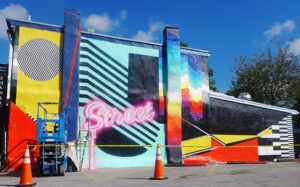by Kerry Torpey on April 19, 2018
Arts & Entertainment

by Sara Conway ’21
A&E Staff
As a historian and documentary filmmaker, Michael T. Barry, Jr. ’16 creates “films that provide a voice to people and topics” that are “often forgotten or marginalized,” according The Activist History Review.
A Providence College alumnus, Barry earned a Master’s degree in American and Middle Eastern history in 2016, and is currently working towards a PhD in history from American University. In 2014, his film Sincerity: From X to El-Shabazz was released, winning a Carter G. Woodson Award the same year. Two years later, The Universal Soldier: Vietnam, Barry’s second documentary, received the award for the Best Feature Award at the 2016 Nyack Film Festival.
His newest film was released in March. The film focuses on Washington, D.C.’s vibrant U Street and aims to bring light to the history of the neighborhood which is often ignored. This film features interviews and commentary by Dr. Ibram X. Kendi, a National Book Award winner and the founder of the Antiracist Research and Policy Center at American University, Dr. Derek Hyra, the founder of the Metropolitan Policy Center also at American University, the Twins Jazz Club owners, Kelly and Maze Tesfaye and Love-Leigh Beasley, and the organizer of Funk Parade, Chris Naoum.
The African-American roots of U Street and its thriving culture rivaled that of New York’s Harlem Renaissance, but was pushed aside by the popularity of the latter during the 1920s. Many are unaware of U Street’s history and the fact that it was home to artists, thinkers, and musicians such as Duke Ellington. However, riots and rebellions destroyed the neighborhood, especially in response to the assassination of Dr. Martin Luther King, Jr.
As a result, the old was pushed out and the new forced itself in, initiating yet another example of urban gentrification. Attempts to re-establish business in the neighborhood brought in those with more money and, with it, “cultural decimation.” U Street shifted from being a predominantly black neighborhood to one of white millennials. The flood and ignorance of the new was “ruining the history and culture” of those originally in the neighborhood.
U Street Contested aims to “preserve” and “honor” the history of U Street by recognizing and promoting it. The film does so by highlighting the importance of mom-and-pop shops in keeping the U Street culture strong, such as the Twins Jazz Club. These places, however, do struggle to survive against the competition of the area.
Another effort to revitalize the history of U Street manifests in the Funk Parade. The springtime festival launched in 2014 with the purpose of supporting the U Street neighborhood in its collaboration with local clubs and artists. This event extends all day and into the night, bringing thousands of people and different pieces of the city together in an endeavor to “minimize the gap” and celebrate the history of U Street.
U Street Contested emphasizes the importance of acknowledging the history of an area and doing so “as often as possible.” A solution to “break[ing] the segregation” rises in the engagement between the people in the area, as seen in the efforts of the Funk Parade.
Barry hopes that his new documentary “can bring people together to discuss the changes occurring in [other people’s] communities” through its “activist spirit.” In an interview with The Activist History Review, an online resource dedicated to connecting the past with the present through an activist lens, Barry emphasizes that he believes that hisotry “can bring about lasting and substantial changes in our nation and world.”
Barry and his films bring attention to those forgotten histories, a fact that should inspire the Providence College community and beyond to enact change.